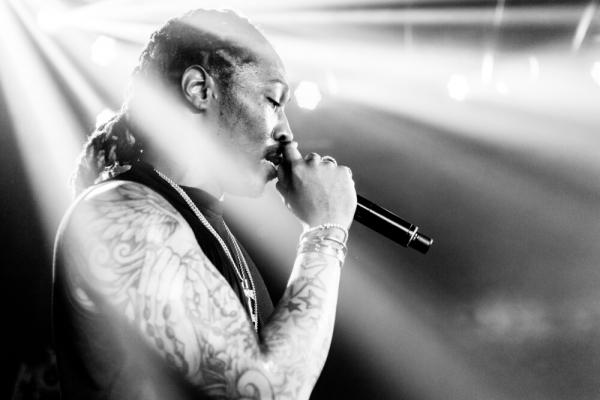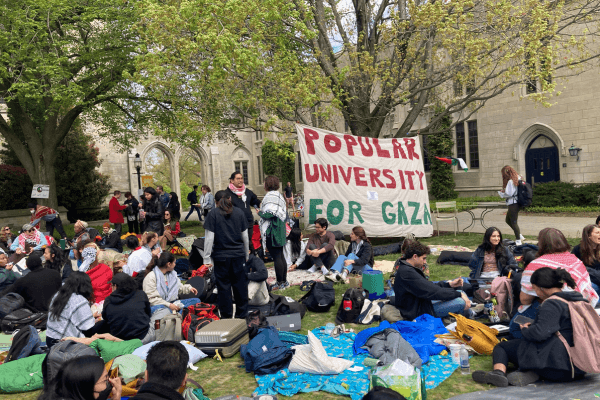The themes associated with “Gangster rap” and its successor, “Trap music,” are often thought of as being as far away from Christian morals as the East is from West. Heavy on percussion and profanity, its tracks hit hard and depict the violence of black life interspersed with tales of excess, sex, and money. While some may discount hip-hop music as vulgar entertainment, it indicates a people’s great hunger for getting more out of this world.
In 2015, Vince Staples — then a moderately known 22-year-old rapper from Long Beach, Calif. — released his debut album Summertime ‘06. Its first track, “Lift Me Up,” begins its chorus with the lines: “See, this weight is on my shoulders, pray Jehovah lift me up/and my pain is never over, pills and potions lift me up/I just want to live it up, can a motherf***r breathe.” Released to critical acclaim, Summertime ‘06 launched Staples into stardom and hung heavy on the minds of many young black people.
Several months prior, the hugely popular artist Future released the hit song “Trap Niggas.” Speaking on his intention behind the song, Future said he meant it as motivational: “Wherever you make your money at, wherever you get your hustle on at, that’s your trap. I feel like we use trapped as in trapped in a position where you can’t get out, so I’m adding more life to the word, making it uplifting… so even if you trapped, your gonna be blessed to get out that situation.”
Other artists such as Juice Wrld — who gained massive popularity through the internet — have songs like "Empty" that speak to a loneliness and nihilism that deeply resonates with my generation. Just as some may plead to God for relief, others speak directly to their lack of fulfillment, preaching to the emptiness created by a world seemingly without cohesion. In a world where black youths are five times more likely to be incarcerated over white youths, and unarmed black boys are still being killed, these prophets of nihilism speak to our fear and sorrow.
In his 1955 book Deep River, theologian Howard Thurman describes the subversive aspect of early slave spirituals: “Many liberties were taken with the religious ideas. For here we are dealing not with a conceptual approach to religion but with an intensely practical one based on the tragedy of great need.” As Thurman articulates, the spirituals were a creative synthesis of the spiritual needs of the oppressed with their outward oppressive condition. In their songs, they sought reconciliation with God, comfort by God, and liberation from bondage.
Almost 200 years later, the same synthesis occurs in Vince Staples' pleading for God to lift him up above his pain and with Future declaring that God is “blessing all the trap niggas.” Even in Juice Wrld's music, there is the recognition of something missing that can only be partially filled by the deeply spiritual process of creativity and music. Amid the spiritual longing of the people, the realities of life will ultimately persist and, for many, force them to articulate their longing in the language of their world.
Since rap music’s inception, some of its most vocal critics came not only from white America, but from within the black Christian community. As Rev. Calvin O. Butts famously put it: “We’re not against rap, we’re not against rappers but we’re against those thugs who disgrace our community, [and] who disgrace our culture.” Ironically, Butts’ quote was made famous by its explicit use within a rap song. Although Butts claims he isn’t against rap, but only against “thugs,” implicit in his statement is that the cultural reality of many black rappers (and black rap fans) is disgraceful to his community and his culture. This assertion is idiomatic of a certain stereotypical view on hip-hop culture: That it is inherently contrary, even harmful, to the messages and morals of the upstanding black Christian.
I had listened to rap music way before I had ever listened to — or even heard — black gospel music. Growing up, I had vaguely heard high church hymns and the occasional reference to spirituals, but I never knew what actual church worship or gospel music sounded like until my twenties. What I did know was that Christians had their own “pure” world of music, that Christian rap as a genre was inherently uncool, and that “worldly” rap wasn’t allowed for good Christians. Yet, it was rap — full of violence and indecency — which deepened my life and colored some of my most profound religious experiences. For me, I related more to the experience of Vince Staples and Future than I did to the hymns and spirituals I felt distant from in spite of their beauty.
After I had been introduced to Christianity, I was under the assumption that my choice of music would change along with my faith. In my mind, it was inappropriate for me to follow Christ and still indulge in the “worldly” music I had been brought up on. As some pastors have said, I felt like rap was disgraceful to my newfound Christian culture. Jesus couldn’t be in the trap: It was vulgar, violent, and poor. Yet, it was always in rap that I heard my needs, my wants, and my fears articulated in my language. My great fear was this: If rap and hip-hop culture were contrary to Christianity, was I — born out of and nurtured by hip-hop — contrary to Christianity as a black man?
As I grew in my faith, however, it became clear to me, as theologian James Cone says in God of The Oppressed, that Christ “is an event of liberation, a happening in the lives of oppressed people struggling for ... freedom.” To make it plain: Jesus was in the trap and came distinctly for those in the trap. Christ himself says in Mark 2:17: “It is not the healthy who need a doctor, but the sick. I have not come to call the righteous, but sinners.” More than being a strict enforcer of “correct” worship music, Christ stands at the head of my spiritual needs as my ultimate freedom from those wants, needs, and fears that, for me, are best articulated by rap music. Just as the spirituals of old and the gospel music of recent past spoke to the needs of some, many today find the spirit moving within the beats and rhymes of rap music.
Got something to say about what you're reading? We value your feedback!







